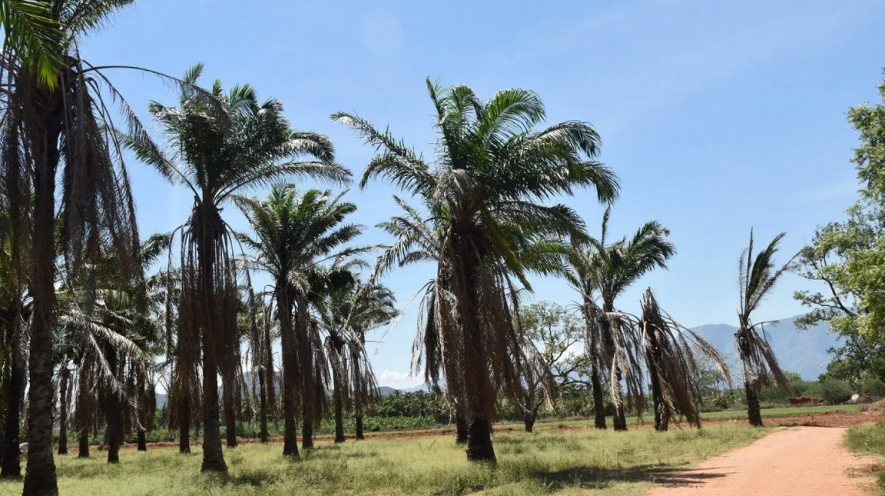Assam: Patanjali to Cultivate Palm Oil Despite Warnings

Image Courtesy: Northeast Now
The Bharatiya Janata Party (BJP) government of Assam has signed an agreement with Patanjali Foods Limited, formerly known as Ruchi Soya Industries Limited, to cultivate palm oil despite environmental experts and politicians warning of the adverse impact on biodiversity, tribes and species of the Northeast.
The agreement follows the Narendra Modi government’s launch of the Rs 11,040 crore ‘National Mission on Edible Oils—Oil Palm (NMEO-OP) with a special focus on the Northeast region and the Andaman and Nicobar (A&N) Islands to reduce the “heavy dependence on the imports of edible oils”. The mission intends to cover an additional area of 6.5 lakh hectares for palm oil till 2025-26 and thereby reaching the target of 10 lakh hectares ultimately.
According to a memorandum of understanding signed between the state agriculture department and Patanjali Foods, palm oil will be cultivated in the districts of Tinsukia, Jorhat, Golaghat, Nagaon, Kamrup and parts of Goalpara, Northeast Now reported.
“We plan to set up palm oil plantations in the Northeast. We have completed our survey there. We have plans for Assam, Tripura, Meghalaya and Manipur, among others,” Patanjali Ayurved cofounder and yoga expert Baba Ramdev had told the PTI in August 2021. “We want to make India self-sustainable in edible oil. The groundwork for the plan has been done. It can be started at any time,” he had said.
Assam, Tripura, West Bengal, A&N Islands, Gujarat, Goa, Andhra, Karnataka, Kerala, Tamil Nadu and Maharashtra already have scattered plantations of palm oil. The country imports most of its palm oil from South East Asia with edible oils being an essential ingredient of Indian foods. A high rate of import duty on palm oil also makes it attractive to grow locally. India’s effective tax rate on crude palm oil is 30.25%.
Environmentalists have warned that widespread oil palm cultivation will damage biodiversity, drain groundwater resources and cause immense destruction of flora and fauna, leading to irreparable damage to the state.
The Association for Environmental Preservation and Conservation Mizoram had earlier warned that the Centre’s move to promote oil palm cultivation in the Northeast and the Andaman and Nicobar Islands could be disastrous.
Last October, Congress MP Pradyut Bordoloi had urged Prime Minister Narendra Modi to reconsider the palm oil project in Assam. In a letter addressed to Modi, he had urged to consider the negative impacts on the region’s environment due to the palm oil mission in the Northeast.
According to the letter, the scientific community had claimed that while oil palm cultivation may generate in the short term, it is not a sustainable long-term strategy.
In August 2021, Newsclick had reported that how palm oil production causes large-scale deforestation, extinction of species and impacts rainforests.
Indonesia, which accounts for more than 80% of global palm oil production, is now grappling with the enormous challenge of coping with the damage. Africa too is dealing with the inroads the industry has made into the Amazon causing land conflict. Owing to its versatility, palm oil dominates major product industries and the cooking industry. However since it is a mono-culture crop, it causes soil degradation, river pollution and affects the overall biodiversity of a region.
In 2014-15, the Centre had launched the National Mission on Oilseeds and Oil Palm, which continued till 2017-18. However, since 2018-19, the mission is being implemented under the National Food Security Mission.
Sricharan Behera, from the Campaign for Survival and Dignity, had told Newsclick, “The palm oil industry has many dangers and it will affect the biodiversity in the region. Its greatest impact will be on tribal regions. This is also aimed at the corporatisation of natural resources. While the government claims that this is about making India self-reliant, it will destroy the locally-created self-sustaining systems, affecting our economy, health and overall biodiversity.”
The slow disappearance of species and the mono-culture nature of palm oil plantations will also affect the biodiversity in the area, leading to even more local species going extinct. There has also been a marked increase in poaching in deforested regions, according to reports.
A major concern with the increasing footprint of the palm oil industry remains the degradation of forest cover as seen across the world. India’s push towards palm oil comes at a time when the Centre has diluted many provisions aimed at the protecting forest land and the compensatory afforestation rules.
In May 2019, the government had modified the compensatory afforestation rules via an order allowing states with high forest cover and seeking diversion of forestland for non-forestry projects to carry out compensatory afforestation in other states. The guideline notes that states with more than 75% of their total land as forests shall not be required to provide non-forest land for compensatory afforestation and this can now be carried out in another state. The move was seen as one which benefited corporate giants by absolving them of any responsibility towards communities and the ecosystems of the region.
Shillong Tarun Bhartiya, an activist and documentary filmmaker from the Northeast, told Newsclick about the effects on tribal land. “The land systems in the Northeast are based on the notions of commons and land is owned by clans. This will be a move targeted towards a corporate land grab. Moreover, the states being mentioned by Patanjali are in the Sixth Schedule of the Constitution, which makes buying land by private parties difficult. We have been hearing of private-public partnerships. We have seen examples of failed experiments by the government such as the generation of biodiesel from Jatropha crops, which failed miserably. The key question is will this lead to similar consequences?”
Get the latest reports & analysis with people's perspective on Protests, movements & deep analytical videos, discussions of the current affairs in your Telegram app. Subscribe to NewsClick's Telegram channel & get Real-Time updates on stories, as they get published on our website.
























